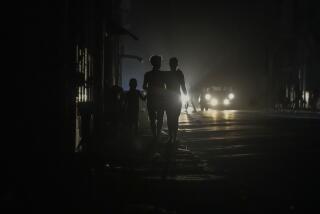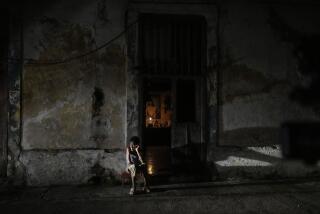A Darkened City Finds Itself in NATO’s Grip
- Share via
BELGRADE, Yugoslavia — In Freedom Square this week, a folk group got a few hundred people to pause long enough to hear “Tamo Daleko,” a patriotic Serbian song from World War I. There was no microphone--Belgrade was struggling through a power blackout--and the midday concert was shortened to that one number.
No longer do the city’s free daily concerts rally thousands of spirited Belgraders as they did at the start of NATO’s bombing assault on Yugoslavia six weeks ago. The giddy mood of defiance, captured by the bull’s-eye sign that proliferated on buttons and billboards last month, has given way to one of edginess and vulnerability.
NATO’s sabotage of the power grid Sunday night brought the war home to people here in the Yugoslav capital and elsewhere in the country more starkly than had all the previous weeks’ bombings of factories, fuel depots, bridges, railroads, highways and random civilian neighborhoods.
The blackout continued Tuesday night in scattered parts of the city, and Belgrade was again plunged into darkness early today for 15 to 30 minutes before power was largely restored. The outages halted elevators, dried up faucets, disabled stoves, thawed frozen food, knocked out traffic lights and shut down bakeries. About 4,000 kidney patients on dialysis machines and 70 premature babies in incubators were at the mercy of hospital generators that are running out of fuel, the Health Ministry said.
“We’re not giving up, but we’re scared and don’t know what we can do,” said Iva Mladenovic, 18, who was lingering with a friend in Freedom Square on Tuesday. “That spirit we had when all this started has fallen down.”
Her schoolmate, Ana Milosevic, said the combination of bombs and darkness made her cry for the first time since March 24, when the North Atlantic Treaty Organization began the assault aimed at forcing Yugoslav leaders to settle the conflict in Kosovo. The schoolmate is not related to Yugoslav President Slobodan Milosevic.
In outdoor markets and cafes, on street corners and in apartment kitchens Tuesday, residents of the Yugoslav capital said the most striking result of the blackout is a helpless feeling that NATO’s military planners now control a big part of their lives.
“It’s not just the food that’s spoiled and the appliances that don’t work,” said Ana Trninic, a 37-year-old librarian. “It’s the fear inside of me. After the lights went out, I was afraid to fall asleep. I thought I might never wake up again.”
“The blackout did not bring us death, but it pumped up our rage,” added Milos, a 22-year-old bartender who was serving raspberry juice to Trninic and some friends as another air raid siren went off. “I am enraged because I have no way to fight back.”
NATO is trying to force Milosevic to accept autonomy for the ethnic Albanian majority in Kosovo and withdraw his troops from the province, which is part of Yugoslavia’s dominant republic, Serbia. The Yugoslav president has rejected terms of a settlement offered by the West as a condition to stop the bombing.
Wary of the war’s infringement on their lives, or perhaps encouraged by a Russian peace initiative, some Belgraders have withdrawn from the defiant official line of their government that NATO must be resisted at all costs.
“The two sides must compromise--NATO and Milosevic,” said Petar, a 34-year-old kiosk operator who, as did several people, asked that his last name not be used. He sold nearly his entire stock of batteries Tuesday. “It would not be fair if we lose Kosovo, but there aren’t enough of us willing to die for it.”
Many of those interviewed said the first night of the blackout made the fear of death more real. When the power grid went Sunday, Alexa Djilas stepped onto his balcony and watched as the city grew so dark that it looked as if he were viewing the bottom of an ocean.
Three nights earlier, from her 14th-story apartment, Marija Djurdjevic had watched the flash of NATO’s first direct hit on a Belgrade home, which injured four people. From the same windows late Sunday, she saw the city succumb to a blackness relieved only by occasional flashes of Yugoslav antiaircraft guns.
“The bombs were the worst things I had ever experienced,” said Djurdjevic, 33, the wife of a rock musician. But when the blackout came, “I thought this was the end. There would be no escape from hell.”
It took her two hours to lull her frightened 6-year-old, Sonja, to sleep by promising that the light would come back on soon. But it did not, and the darkness kept Djurdjevic awake until dawn.
As utility crews worked a second day to repair the grid and restore full power, many of the city’s 2 million people went out to buy candles and batteries. There was no sign of panic or disorder.
But there were calculations in every household of the risks ahead.
Petar, the kiosk operator, said the blackout forced him to rethink a summer vacation in Greece and consider spending his money to stock up on food, which so far has remained plentiful here.
Darko, a 31-year-old businessman, said his livelihood is tied up in a Belgrade tannery due to open within 10 days. But the joint venture is heavily dependent on water and electricity, he said, so its Italian partners are likely to delay.
Smoking nervously in his tiny kitchen, Darko said that, if the power keeps going out, he will send his wife and daughter to ride out the war at a friend’s home in Cyprus.
“I cannot imagine her childhood here,” he said, cuddling the year-old child. “She doesn’t deserve to live like this. No one does.”
More to Read
Sign up for Essential California
The most important California stories and recommendations in your inbox every morning.
You may occasionally receive promotional content from the Los Angeles Times.









